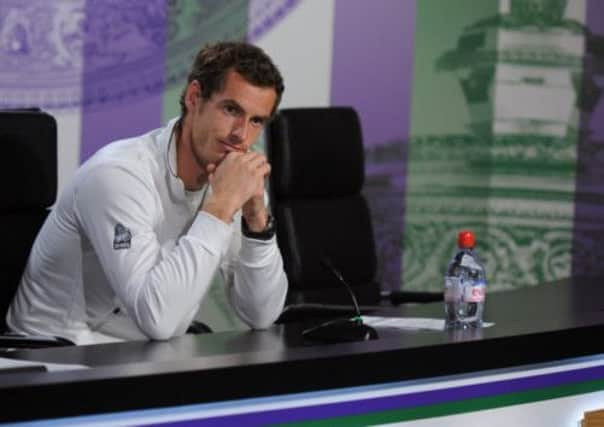Andy Murray Wimbledon: Murray paves way for legacy


And then Andy Murray grew up and suddenly a nation dared to believe that this tall, basically shy boy from Scotland could do the unthinkable and win at the All England Club. There had been false dawns before, days when the likes of Tim Henman had knocked on the door of the final but had been turned away by bigger, stronger men at the semi-final stage. But this seemed different: Murray was the real deal – his US Open and Olympic triumphs had proved that.
Even so, to win at Wimbledon as a Brit is to overcome pressure that no other player has to face on any court, anywhere else in the world. For 77 years, no man had been able to do it and for most of his 26 years, Murray had dreamed of little else. And then, in a little over three hours of brilliance, aggression and total focus on the goal ahead of him, the world No 2 beat Novak Djokovic 6-4, 7-5, 6-4.
Advertisement
Hide AdAdvertisement
Hide AdIf winning the US Open last summer had lifted a weight off his shoulders – he was now Britain’s first male grand slam champion in 76 years – then yesterday’s victory was a Houdini-like moment: Murray had at last broken free from the straitjacket that had restricted and enveloped every British pretender to the title for decades. The sheer force of national expectation had shackled generations of good men; Murray was the only one who had the strength of body, heart and character to bear it. But it wasn’t easy.
“It’s hard,” he said, simply. “It’s really hard. You know, for the last four or five years, it’s been very, very tough, very stressful, a lot of pressure. The few days before the tournament, really difficult, as well. The last two days are not easy. Because it’s just kind of everywhere you go. It’s so hard to avoid everything because of how big this event is, but also because of the history and no Brit having won. It’s been very, very difficult.
“I think I felt a little bit better this year than I did last year. But it’s not easy. I think now it will become easier. I hope it will. I hope it will.”
If history – Murray’s history – is any guide, yesterday’s win could make everything so much easier. After he won his first grand slam title, he was free to play his game, his way, at the major championships. No longer worried that he may let a half-chance slip and that his only opportunity to win a slam might have gone, he was a different player.
Now that he has won Wimbledon and been freed of the biggest burden in tennis, he need never feel fear or tension on a tennis court again. The response of the Centre Court crowd, usually a tense and restrained audience at best, has been remarkable this year. They have embraced Murray, taken him to their hearts and cheered him like never before.
His tears as a beaten finalist last summer showed everyone how much the tournament meant to him; his response at the Olympics and at the US Open showed them what talent, courage and spirit he had. Now, when he comes back to the Centre Court, it will be his fortress and the crowd will be his body guards. No man, be it Djokovic, Rafael Nadal or Roger Federer will want to play Murray on Centre Court again.
Djokovic had a sense of it yesterday. The look on his face as a volley flopped into the net or a return went wide and 15,000 cheered their approval said it all: he was playing not just one opponent but 15,001. And that was too much for one man, even the world No 1, to take on. Alas, there will be little time for Murray to enjoy his success.
In a couple of months he must attempt to defend his US Open title but before he goes to New York, there are two Masters 1000 events to contend with, one in Montreal and one in Cincinnati.
Advertisement
Hide AdAdvertisement
Hide AdAnd before he can start that run, he needs to train and prepare for the challenges of the brutal hard courts and the heat and humidity of the North American summer.
And in America, Djokovic will be looking for revenge and Federer – remember him? – will be looking to repair his reputation after his second-round loss here. As for Nadal, everyone is waiting to see how his knees are holding up and whether he is physically able to withstand the demands of the hard-court swing.
For the moment, though, the universe revolves around SW19 and Murray must try and take in what he has just achieved. Maybe now, he will not be asked about Fred Perry and the last time a British man won at Wimbledon. Maybe now he will be ready to create a legacy of his own. And maybe, once Murray has hung up his racket and retired to polish his trophies, Britain will not have to wait another 77 years for another home-grown hero.
“I would hope that it wouldn’t be that long again,” Murray said. “It was an incredibly difficult tournament to win, so it’s possible that it could take a long time. But, yeah, I think with the amount of money that’s invested in the sport in this country, then it shouldn’t take another 70-odd years.”
Until that moment comes, though, Murray has free rein to let his talent loose on the major tournaments. If he can withstand the pressure of Britain’s 77-year hoodoo at the All England Club, nothing will ever seem as difficult again. Roll on the US Open.